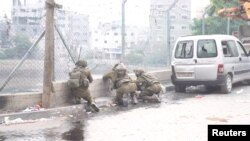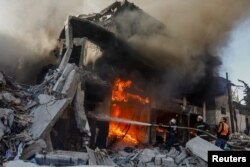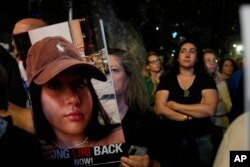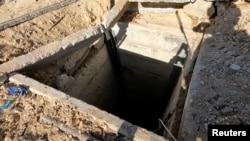Israel intensified its attacks across Gaza Saturday and expanded its evacuation orders in southern Gaza, a day after the United Nations Security Council failed to pass a proposed resolution calling for an immediate humanitarian cease-fire in the war between Israel and the U.S.-designated terror group Hamas.
Israel ordered residents Saturday to evacuate the center of Gaza's main southern city, Khan Younis, while the dead and wounded are piling up at the overwhelmed Nasser hospital there.
So far, the vast majority of Gaza's 2.3 million residents already have been forced from their homes, many fleeing several times. With fighting raging across the length of the territory, residents and U.N. agencies say there is effectively nowhere safe to go now. Israel disputes this.
The World Health Organization's executive board is scheduled to meet Sunday to discuss the health situation in Gaza.
More than a dozen WHO member states already have expressed "grave concern” about the catastrophic humanitarian situation in the enclave. Gaza residents “are being told to move like human pinballs — ricocheting between ever-smaller slivers of the south, without any of the basics for survival,” U.N. Secretary-General Antonio Guterres said Friday.
"The people of Gaza are looking into the abyss," Guterres said. "The international community must do everything possible to end their ordeal."
U.S. veto
Israel’s expanded military operations come on the heels of Washington’s veto of the proposed Security Council resolution Friday, diplomatically isolating it from the rest of the group.
Turkey's ministry of foreign affairs called the impasse a "complete disappointment."
"Our friends once again expressed that America is now alone on this issue, especially in the voting held at the United Nations today," Turkish Foreign Minister Hakan Fidan said in an interview Friday with state broadcaster TRT, after he and his counterparts from the Organization of Islamic Cooperation and the Arab League met with U.S. Secretary of State Antony Blinken in Washington.
Agnes Callamard, the secretary-general of the international rights advocacy group Amnesty International also disagreed with the U.S. veto, calling it “morally indefensible and a dereliction of the U.S. duty to prevent atrocity crimes and uphold international law.”
The U.S. reasoning against a cease-fire is that it would allow Hamas to regroup and carry out fresh incursions. Washington instead supports pauses in fighting to protect civilians and allow the release of hostages taken by the militants during the October 7 terror attack on Israel.
Israeli hostages
Several hundreds of families, friends and supporters of Israeli hostages held by Hamas militants in Gaza rallied Saturday in Tel Aviv at the "Hostages Plaza," calling on the Israeli government to secure the hostages’ release.
Signs of trauma are evident in the small children who were among the hostages released by Hamas.
“They looked like shadows of children,” said Dr. Efrat Bron-Harlev of Schneider Children’s Medical Center in suburban Tel Aviv, who helped treat more than two dozen former captives, most of them youngsters.
Some had not been allowed to bathe during the entirety of their captivity. Many had lost up to 15% of their total weight but were reluctant to eat the food they were served.
Asked why, the answer came in whispers: “Because we have to keep it for later.”
One 13-year-old girl recounted how she’d spent the entirety of captivity believing that her family had abandoned her, a message reinforced by her kidnappers, Bron-Harlev said.
Hamas tunnels
Also Friday, Israel said it had discovered a new tunnel, weapons and Hamas facilities under Gaza — evidence, it says, that Hamas, carries out military operations through an extensive network running underneath civilian infrastructure.
The military did not provide video or photo evidence of the kilometer-long tunnel extending from the campus of Al-Azhar University in Gaza to a nearby school, but it released photos of weapons soldiers allegedly found at the university, including explosives and rocket parts.
The military said it also found a Hamas control room with cameras, phones, walkie-talkies and weapons near a hospital in northern Gaza, as well as an additional tunnel entrance. A photo released by the military showed an opening to an underground passageway with a ladder stretching downward.
Israel said such discoveries show that Hamas is entrenched in civilian areas — a claim central to its justification for intensifying its attacks on the enclave and calling for more mass evacuations on civilian areas there.
Meanwhile, Israel rounded up Palestinian men in northern Gaza for interrogation, the military said Friday. Video has emerged of the apprehended men in the town of Beit Lahiya, dressed only in their underwear and sitting on the ground.
The Middle East has been a tinderbox since Iranian-backed Hamas launched a terrorist attack on Israel on October 7, killing at least 1,200 people while taking about 240 people hostage, Israel said. Israel's retaliatory strikes and ground offensive have killed more than 17,700 Palestinians, according to the Hamas-run Gaza Health Ministry.
Thousands more are missing and presumed buried under rubble. Seventy percent of the victims are women and children, according to the health ministry.
Ninety-four Israeli soldiers have been killed fighting in Gaza since its ground invasion of the enclave began, according to the Israeli military.
US ammunitions
Secretary of State Blinken has approved a possible Foreign Military Sale to Israel of 120 mm M830A1 High Explosive Anti-Tank Multi-Purpose with Tracer tank cartridges and related equipment for an estimated cost of $106.5 million, according to a statement.
The Defense Security Cooperation Agency delivered the required certification notifying Congress of this possible sale on Friday.
“The United States is committed to the security of Israel, and it is vital to U.S. national interests to assist Israel to develop and maintain a strong and ready self-defense capability. This proposed sale is consistent with those objectives,” the statement said. The ammunition would come from U.S. inventory.
The Biden administration asked Congress Friday to approve the sale of 45,000 shells for Israel’s Merkava tanks in the offensive against Hamas, according to a current U.S. official and a former U.S. official.
Washington’s request for tank shells has added to growing concerns about the supply of U.S. weapons in a war that has killed thousands of civilians in the Palestinian enclave since Hamas’ terror attack on Israel two months ago.
VOA U.N. Correspondent Margaret Besheer contributed to this story. Some information for this article was provided by The Associated Press, Agence France-Presse and Reuters.









